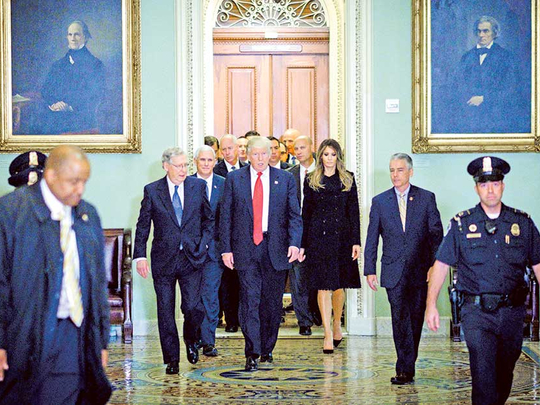
Abu Dhabi: Donald Trump’s victory in the US presidential race last Wednesday cast new doubts over whether the Federal Reserve will go ahead with the anticipated interest rate hikes in December and in 2017.
While financial markets data show a higher probability of a rate hike in December, some analysts said the Fed may prefer to send a dovish signal to markets next month, considering that Trump represents great uncertainty for both the political and the economic outlook.
A day after Trump’s victory, Bank of America Merrill Lynch (BofAML) analysts issued a report saying they lowered the Gross Domestic Product (GDP) growth forecast for 2017 to 1.8 per cent from 2.1 per cent. BofAML analysts predict weaker capital spending, lower job growth, and lower consumption rates.
The bank also said in its report it expects one rather than three Fed rate hikes between now and the end of 2017, with the probability of a December hike falling to 1-in-3.
That view was echoed by other market experts, most notably Larry Summers, economics professor at Harvard University and former US Treasury Secretary, who told Bloomberg TV on Thursday he hasn’t seen a case for an interest-rate increase.
Summers said inflation was still below the Fed’s target of two per cent, and risks in policy were more skewed towards the downside than the upside.
Political factors
But it’s not just economic factors that play into the question of upcoming Fed rate hikes.
During his campaign, Trump criticised the Fed’s low interest rate policy on multiple occasions, even attacking the Fed’s chair, Janet Yellen, saying she was deliberately keeping rates low.
“Given the Trump victory, will Janet Yellen feel she has to resign her chairmanship of the US Federal Reserve? So vocal has Trump’s criticism of her been that she may feel she has to go in order to preserve the Fed’s integrity,” said Richard Buxton, head of UK equities at Old Mutual Global Investors.
In an emailed statement, he added, “Presumably, vice-chair, Stanley Fischer, will step up to present stability and calm financial markets. The December interest rate rise is likely to be off, pending assessment of the economic impact of the election result, unless a supremely-confident Federal Open Market Committee (FOMC) feels that pressing ahead with a rate rise is the best way to show its independence by rising above the cut and thirst of the political noise.”
Despite that, financial markets tell a different story.
Medium term outlook
On Thursday afternoon, around 24 hours after Trump’s victory was announced, the probability of a December rate hike was at roughly 85 per cent, up from around 70 per cent in the few weeks before Trump’s win, according to Bloomberg data.
The increase stems from Trump’s rhetoric during his campaign — and during his victory speech — that his economic policies will be pro-growth and that he favours a higher-interest-rate environment.
If he keeps his promises, the outlook for rate hikes on the medium term could be different.
“I think there’s a possibility of accelerated rate hikes in 2017 — possibly three rate hikes rather than the two that were anticipated. I think the probability of a December rate hike has also shot up … and that’s because of the size of infrastructure projects that Trump is likely to execute and the impact that it has on inflation and the economy as a whole,” said Saleem Khokhar, head of fund management at the National Bank of Abu Dhabi’s asset management group.
In fact, it was these very factors relating to strong infrastructure spending and higher inflation that spurred gains in equity markets across the world starting Thursday. The rise was a complete U-turn from the plunge equity indices took on Wednesday when Trump’s victory was announced.
Asked whether he believed Trump on his policy stance, Khokhar said it was too early to judge, but that the president-elect was too adamant on his growth policies. Khokhar pointed that such rate hikes would be positive for equity markets on the long run, but would hurt the bond market.










